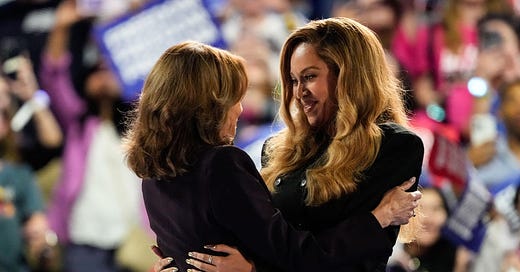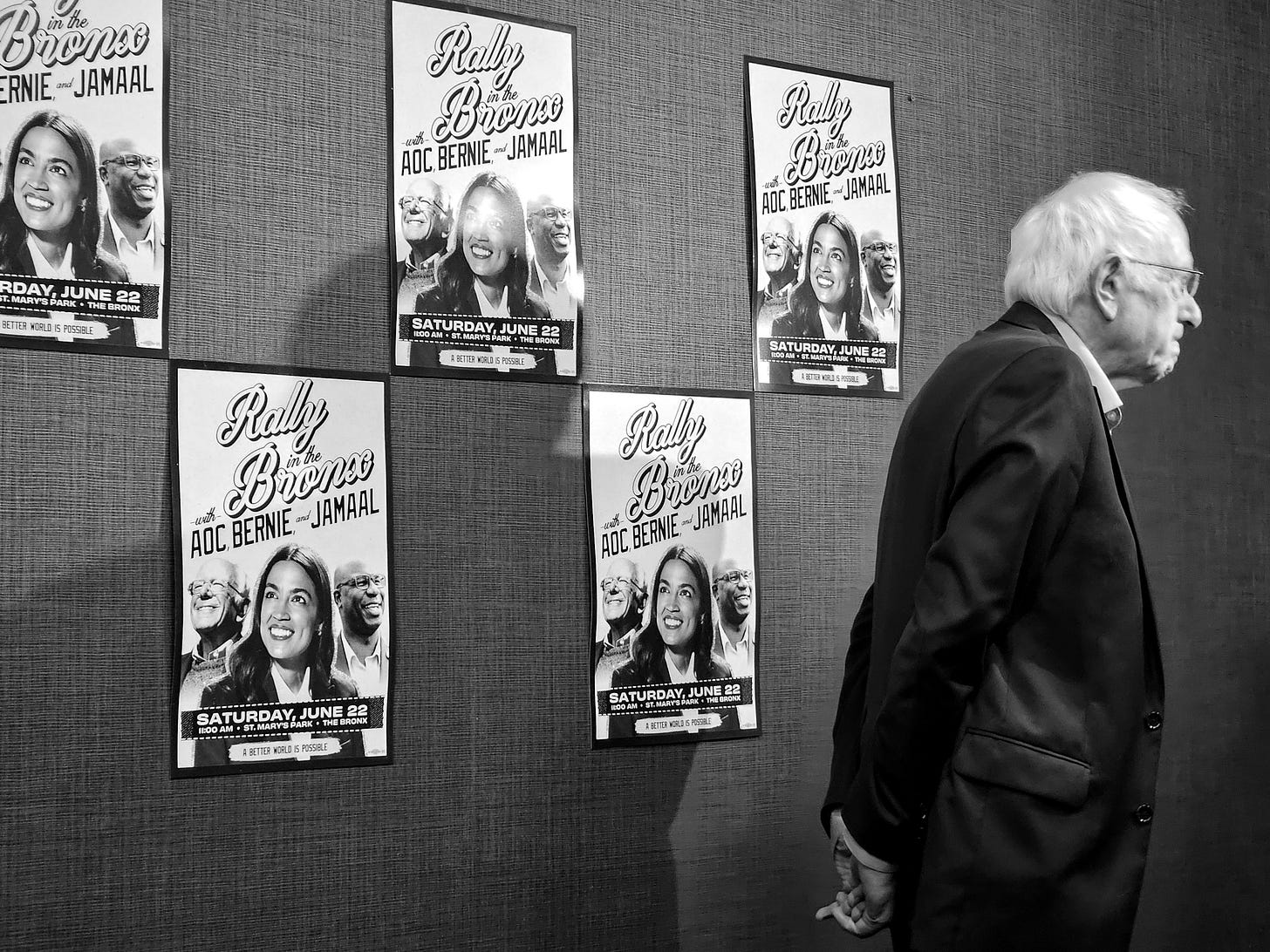Kamala was the celebrity candidate. It didn't help.
Democrats need to stop chasing celebrity clout and reconnect with the working class
There is a growing disconnect between the everyday realities of the working class and the celebrity culture that Democrats repeatedly court through the party’s obsession with status, trends, and pop culture figureheads that simply don’t translate to a win at the polls. Vice President Kamala Harris’s loss is a stark reminder of the ill-equipped yet often employed mainstream Democratic strategies that have led the country to what feels like a repeat of 2016.
While it was a brat summer—that not-always-understood viral trend based on singer Charli xcx’s album that Harris became inexplicably yet intrinsically linked to—that momentum didn't carry Harris into fall. The oversaturation of Harris in celebrity culture, TikTok trends, and trite comedy videos didn't ultimately help her get votes. The Democrats need to stop relying on celebrity momentum, which doesn't work and only continues to divide them from the working class.
Entertainment has never been truly separate from politics. There was movie star Ronald Reagan and JFK, who was so beloved in part because he looked like a movie star. But with social media, entertainment has increasingly seeped into politics. In 2009, when comedian John Stewart won an online TIME Magazine poll naming him as America's most trusted news source, it represented a monumental shift in how Americans viewed news and entertainment. The 2016 election with Trump only heightened that. Trump himself is an entertainer. But Trump also speaks candidly about class issues and the plight of the working class, pretending to be like the people he courts. Weeks before the election, Trump visited men at a Bronx barber shop and said, “You guys are the same as me.”
In this election cycle, Harris fell into the celebrity trap, but not even Beyoncé’s eleventh-hour endorsement of Harris last month could save the campaign. Democrats need to stop courting celebrities and stay on message about working class issues, like housing, education, and universal healthcare. Voters are desperate for depth, especially on issues regarding the economy. The celebrity class has incredibly different concerns and the obsession with celebrity influence only continues to alienate Democrats from the working-class voters who used to reliably vote blue.
Bernie Sanders did better than anyone could have anticipated when he broke into the 2016 race. He was criticized by the media as being curmudgeonly at times, but it was his commitment to focusing on the issues that won him fans. He always found a way to stay on message about working class values. His surge in popularity and unprecedented small donations records proved just how much voters care about substantive messaging. He still has an active presence in progressive politics and even at 83 years old, campaigns for others and always makes time to connect with voters.
But those lessons weren’t applied in this race. Like Hillary Clinton’s campaign, which was bloated with star power, Harris fell into the same trap.
But that obsession with courting celebrities and the false notion that celebrities’ opinions translate into votes simply because of the size of celebrities’ platforms, which are usually for unrelated matters, is a failing strategy. So many voters, especially those struggling with homelessness and access to food and life-saving medicine, can’t be bothered with the class cosplay of the elites.
There is an ever-growing division between class and political parties. It is well-documented now that the more educated a person is, the more likely they are to be a Democrat. But with soaring college costs, this continues to create a divide since college currently isn’t accessible for everyone.
Harris’s campaign simply wasn’t as engaged on a personal level as Trump’s campaign with voters. Without oversimplifying it, it is called winning an election for a reason. Winning requires an action, rather than passively being rewarded with something that feels like it simply should happen because the alternative would be worse. Winning takes time, effort, and dedication. It’s not a guarantee. It has to be earned.
Coasting on endorsements simply doesn’t work. The disastrous spectacle of over relying on star power makes for an alarming trend of loss. This was clear in 2016. It’s clear again now. A candidate has to be out and engaging with voters directly. Celebrities can’t lift a sinking ship. If anything, a celebrity endorsement should be seen as supplemental or even a near-neutral net, not a vehicle to harness hopes of securing a win.
Democrats have become increasingly classified as the party of the elites. This is a problem and it’s antithetical to the core values of a party that is supposed to fight for working class values.
It’s not that Republicans are exempt from courting celebrities but their stars often have, simply, less star power. Hulk Hogan was a prominent voice at the Republican National Convention. At the Democratic National Convention, Harris had P!NK perform, and a host of other celebrities attended, including Oprah Winfrey, Spike Lee, and other stars with serious commercial relevancy. But Trump’s supporters didn’t go to the RNC watch his slate of celebrities. They went there for him. He was the main attraction.
Democrats have built a great narrative and marketability around the idea of voting, but there isn’t the same excitement behind the candidates—and there hasn’t been truly palpable excitement for a nominee in at least in the last three elections. Part of that is because Democrats have lacked true, egalitarian primaries. Many voters have described voting blue for the 2016, 2020, and 2024 election like taking medicine or choosing the lesser evil.
It's not that Harris necessarily lacks substance—and it’s certainly not that Trump has any. But rather, it’s the branding and appearance of caring about working class talking points that matters in an election. It’s a paradox but both candidates seemingly departed from who they were in an attempt to court voters. Trump is a celebrity but was able to convince more than 71 million Americans that he can represent everyday people and fight for the class and economic issues that matter to them. Harris touts a working class background but she followed the cult of celebrity with a lot of fluff during pivotal times in the election cycle with her zany and sometimes downright strange talking points that led to virality in the internet sphere, with TikTok dances and parodies, as well as praise and endorsements from celebrities, but just didn’t translate to votes.
Harris’s campaign’s active use of social media was actually passive in the way it was obsessed with trends that are, as many internet things are, ultimately ephemeral and don’t translate from the online sphere into the real world. The laughs, memes, and celebrity worship couldn’t hold a flame to the intense campaigning of Trump.
Voters need substantive plans that address the tenuous economic situation so many in our nation face. The virality and fun of the celebrity worship world and internet culture leave out so many of our most vulnerable. No more surrogates in the eleventh hour—instead, Democrats need to rely on substantive policy platforms and, rather than focus on the select few stars, focus instead on the masses: the people that stand in line after work to vote.
Feel free to check out more of my work here.







Excellent analysis. Should be in the NY Times!
Thank you for another insightful essay, Vanessa, especially this summary: "It's not that Harris necessarily lacks substance—and it’s certainly not that Trump has any. But rather, it’s the branding and appearance of caring about working class talking points that matters in an election. It’s a paradox but both candidates seemingly departed from who they were in an attempt to court voters."
My sincere hope is that, going forward, the Republican Party will address the concerns and problems that the working class faces, for real and not just in rhetoric; and that the Democratic Party will redirect its attention by studying how people like Sanders are still speaking for the vast majority of Americans. In my travels I met plenty of lifelong Republicans who supported Sanders, and then when Clinton received the nomination, they switched to Trump. Many centrist Democrats did the same, in 2016 and even more so in the two subsequent elections.
In short, what I'm hoping for is that both parties will redirect toward the middle, where I estimate that 70% of us live in our daily lives. And that they will do this in actual policy work and not just to appeal to populism. It's a lofty hope, but I'm going with it.